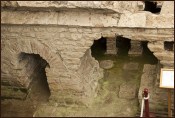Frail Convenience
 The blue LED display on the boiler flashed the letter “F” and then “L” and then “F” again; the sequence then repeated. I sighed. It was late at night, there was no hot water in the house, and this message wasn’t promising at all. I looked it up on the internet: the electrical element which causes the burner to spark into life had failed. I checked the time: 1 AM. Sunday had just crossed the border into Monday. No, I thought, there wouldn’t be any fixing this now. I climbed into bed not too long afterwards and fell asleep, unconsciousness allowing me to forget what kind of day was to come.
The blue LED display on the boiler flashed the letter “F” and then “L” and then “F” again; the sequence then repeated. I sighed. It was late at night, there was no hot water in the house, and this message wasn’t promising at all. I looked it up on the internet: the electrical element which causes the burner to spark into life had failed. I checked the time: 1 AM. Sunday had just crossed the border into Monday. No, I thought, there wouldn’t be any fixing this now. I climbed into bed not too long afterwards and fell asleep, unconsciousness allowing me to forget what kind of day was to come.
The next morning dawned much colder and greyer than seems apropos for July. The sun dappled memories of my youth suggest that early summer is a time of convenient night time rainstorms, so that the earth awakes the next morning fresh and renewed. The rainwater on the lawn should glisten in the sunlight; birds and butterflies should take wing, impatiens should be in bloom with blossoms of red, pink and white. Warmth should be a given. Not here, not now. I cast a look out my back window and saw my laundry swaying on the clothesline, thrice rinsed by heavy storms over the weekend. The fresh ground coffee and vitamins and whole wheat toast smeared with orange marmalade did little to awaken me. I then stepped into the bathroom and realised I needed a shave. “F” then “L” then “F”: I remembered. This would be rather chilly. I ran the tap and half heartedly waited for the water to warm up, hoping for a miracle. “F” then “L” then “F”: I mused at how we take such conveniences for granted. We wake so gently, to coffee and warm water and the breakfast news that any change or roughening of morning’s edges comes as a terrible shock. I splashed the cold water on my face and shaved; it was not unpleasant.
What was more difficult was having to shed my clothes and climb into a shower with only cold water available. My working environment has its demands: one never knows who is going to pay a call. The last CEO of my company was noted for visiting at unexpected times; this may be a tradition continued by her successor. I have been yanked into meetings with important partners of the company without any warning. In other words, it wouldn’t do for me to be unshaven and unwashed; the era in which was normal for the average person to have dirt under the fingernails and a weekly bath whether one needed it or not is long gone. I regarded the crystalline cascade coming down from the shower nozzle for a moment, took a deep breath and stepped into its path.
I try not to swear if I can help it. The first word that sprang to mind was “bracing”; the icy water reminded me of how my other half sometimes chills her hands on a cold drink bottle and places them directly on my back, saying that they are the “hands of doom”. In this case, the frozen grip was all encompassing, as if warmth was at the core of my body and the icy water was trying to push it into an ever more cramped space. I washed my hair and body quickly; my heart pounded. I stepped out, rubbed myself down with a fluffy white towel. I cast a glance at myself in the bathroom mirror: the visage that returned my gaze was not a happy one.
“Well,” I thought, “at least I’m fully awake.”
We take so much of our lives for granted and are genuinely disturbed when something upon which we rely suddenly disappears. The loss of hot water and heat was a physical shock. Towards the end of June, I lost all landline services with my phone and my family couldn’t phone me via that means, which was annoying. I still get irritable when my internet connection drops. I rely on my ability to go to ASDA or Morrisons and find that the shelves are stocked full of food. We expect systems to be robust and that our lives, cossetted and convenient as they are, will go on. Indeed, we think that they will get even better, thanks to constant improvements in technology.
 I can’t help but think of the ruins of Roman baths I saw in Turkey this past April: the stones had cracked due to age and excavation; it was possible to discern how the building was put together. There were brick pillars beneath the floor of the warm baths. This created a space beneath the base of the pool. Hot air was pushed through this gap in order to ensure the water was a comfortable place to be. No doubt the Romans who used those facilities had days when the fuel wouldn’t ignite and every pool was a frigidarium. It’s likely their excellent road network probably had “bad hair days” too: sometimes messages and parcels would get lost along the Appian Way. But like us, they expected technology to provide progress too. However, their society collapsed into the Dark Ages, a time when ignorance, squalor and barbarity became the norm. It’s a reminder: the warm and gadget filled houses which we live in are but a frail bark which shields us from the forces of nature. We have what we have due to complex arrangements which we try not to think about too much, lest we become aware of their fragility. To demonstrate this, it’s worth performing this mental experiment: what would happen if suddenly we ran out of oil?
I can’t help but think of the ruins of Roman baths I saw in Turkey this past April: the stones had cracked due to age and excavation; it was possible to discern how the building was put together. There were brick pillars beneath the floor of the warm baths. This created a space beneath the base of the pool. Hot air was pushed through this gap in order to ensure the water was a comfortable place to be. No doubt the Romans who used those facilities had days when the fuel wouldn’t ignite and every pool was a frigidarium. It’s likely their excellent road network probably had “bad hair days” too: sometimes messages and parcels would get lost along the Appian Way. But like us, they expected technology to provide progress too. However, their society collapsed into the Dark Ages, a time when ignorance, squalor and barbarity became the norm. It’s a reminder: the warm and gadget filled houses which we live in are but a frail bark which shields us from the forces of nature. We have what we have due to complex arrangements which we try not to think about too much, lest we become aware of their fragility. To demonstrate this, it’s worth performing this mental experiment: what would happen if suddenly we ran out of oil?
The immediate answer for most is, “Oh well, I wouldn’t be able to fuel my car.” Yes, but also petrochemicals are a basic ingredient in chemical fertilisers, so farmers wouldn’t be able to grow as many crops. Lorries wouldn’t be able to deliver whatever produce they were able to grow or any other goods: everything from cans of Branston baked beans to packages of spaghetti won’t appear on shelves. We also would lose our ability to make plastics. International commerce would stop as nothing could be shipped or delivered. A lot of homes run off of oil heat: their boilers would run out of fuel. In essence, pull out this one dependency, and it is admittedly a large one, and what we know as the economy completely collapses. Society would likely disintegrate along with it, as we would each be trying to grab hold as much of our old lives as we possibly could.
This is an extreme example: the end of oil supplies is not immediately imminent, although some scientists have suggested we have hit a point at which the amounts we can extract will begin to fall away. Nevertheless, we have time to adjust and adapt. Still, collapse can take generations to play out: consult the histories of Rome, look at the broken stones of their cities and faded inscriptions upon what once was their proud edifices, and think of what came after. We may have time, but as a species we have a bad habit of wasting time, and by the time we realise we have no time to waste, it tends to be too late. The lights are flashing; the writing is on the wall. We should perhaps stop focusing on how powerful or empowered we are, and consider our basic frailty and fragility. Of course the world will go on even if our present order does not; but we need to ask if what would follow is the kind of world that we actually want.
A long time ago, I went to see the historian Dominic Lieven give a talk at the University of London; he spoke passionately about one theme in particular. He stated that there was no school of history more “stupid” than one which suggested that some event was inevitable; he spoke in relation to Edward Hallett Carr’s assertion that what occurred in the Soviet Union was due to some historical necessity. Rather, Lieven urged us all to consider “contingency”, the fact that things can be different. I tend to think that collapse is inevitable, but inevitable is not the same as necessary: we will accrue mistakes that will eventually lead to collapse, but that day can be put off by the choices we make today. Frailty should spur us on to consider our options rather than continue to sleepwalk.


